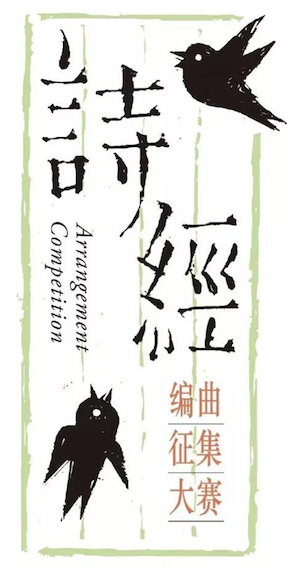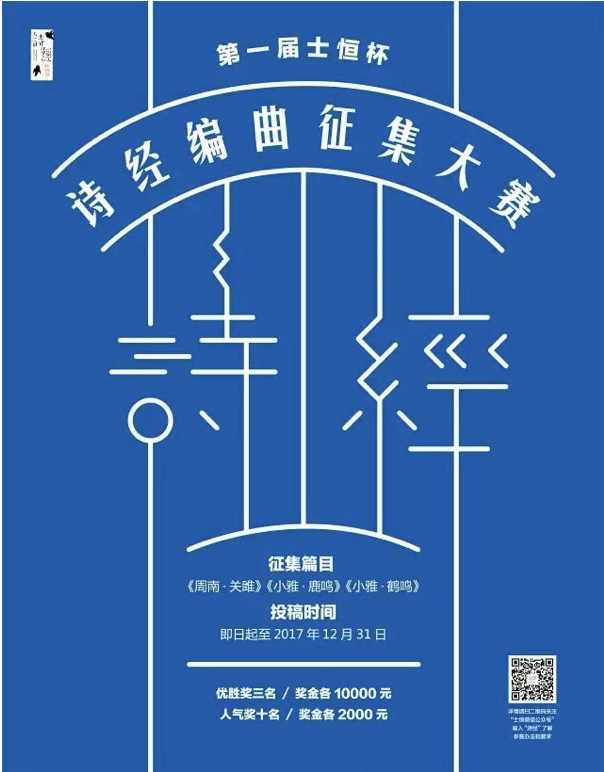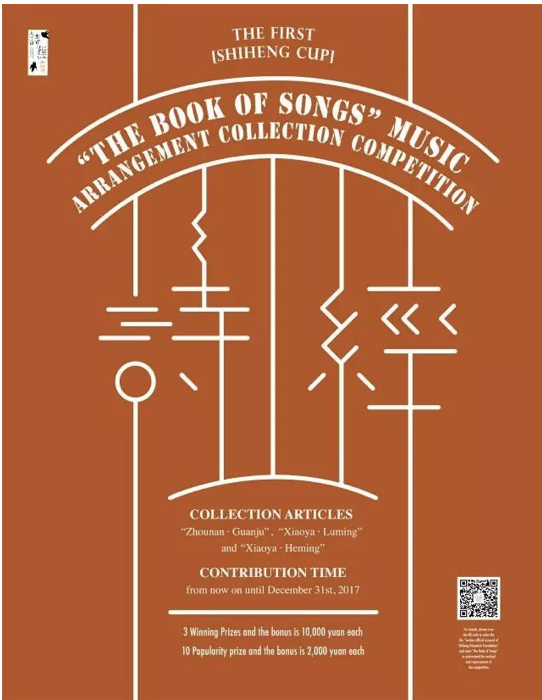首届“士恒杯”《诗经》编曲征集大赛
《诗经》是古人生命的一种存在形式,承载着中华民族的文化精神与心灵世界,也塑造了中国人的生命志趣与道德品格。
诗言志,歌咏言。相传周代设有采诗之官,每年春天,摇着木铎深入民间收集歌谣,然后由太师谱曲传唱。但两千多年后,《诗经》的曲早已遗失,只留下静谧的文字。

云南士恒教育基金会长期从事中国传统文化的弘扬,其中《诗经》歌曲的教学是最有特色的内容,为了丰富国学音乐课的内容,让更多的人感受古风之美,我们特别策划组织“【士恒杯】诗经编曲征集大赛”活动,自2017年开始,每年一届,每届自《诗经》中选出三到五首篇目,向全社会进行编曲征集。
让母语流淌成汩汩的音符,以声音改变身体,低声吟哦、高唱入云。士恒邀您一起为诗经赋曲!
2017年首届征集活动的具体内容如下:
【征集曲目】
《周南·关雎》、《小雅·鹿鸣》、《小雅·鹤鸣》
关关雎鸠,在河之洲。窈窕淑女,君子好逑。
参差荇菜,左右流之。窈窕淑女,寤寐求之。求之不得,寤寐思服。悠哉悠哉,辗转反侧。
参差荇菜,左右采之。窈窕淑女,琴瑟友之。参差荇菜,左右芼之。窈窕淑女,钟鼓乐之。
——《周南·关雎》
呦呦鹿鸣,食野之苹。我有嘉宾,鼓瑟吹笙。吹笙鼓簧,承筐是将。人之好我,示我周行。
呦呦鹿鸣,食野之蒿。我有嘉宾,德音孔昭。视民不恌,君子是则是傚。我有旨酒,嘉宾式燕以敖。
呦呦鹿鸣,食野之芩。我有嘉宾,鼓瑟鼓琴。鼓瑟鼓琴,和乐且湛。我有旨酒,以燕乐嘉宾之心
——《小雅·鹿鸣》
鹤鸣于九皋,声闻于野。鱼潜在渊,或在于渚。乐彼之园,爰有树檀,其下维萚。它山之石,可以为错。
鹤鸣于九皋,声闻于天。鱼在于渚,或潜在渊。乐彼之园,爰有树檀,其下维榖。它山之石,可以攻玉。
——《小雅·鹤鸣》
【征集时间】
1、投稿时间:自公布之日起至2017年12月31日
2、截稿时间:2017年12月31日,以邮箱接收稿件时间为准
3、评选结果公布时间:2018年1月
【具体要求】
1、参赛者在指定的三首篇目中挑选进行编曲投稿,可投单首,也可投多首,评选时以单首为单位进行评选。
2、要求编曲为参赛者原创,并且从未公开发表或演唱。
3、参赛作品应具有较强的韵律感和音乐性,适合大众识别和传唱。
4、参赛作品投稿须提供DEMO小样(常见音频格式)、曲谱格式版本各一份。
【征集方式】
1、在2017年12月31日截稿之前,将参赛作品内容以邮件的形式发至邮箱:yunnanshiheng@sina.com,邮件主题格式为“士恒杯诗经编曲比赛投稿-投稿人姓名”,咨询电话:18725050722 & 18487233135。
2、发送参赛作品同时,请在邮件内注明联系方式,包括姓名、地址、工作单位(或学校)、联系电话等。
【评选方式及奖项设置】
1、优胜奖
由北京大学儒行社、云南大学儒行社、云南财经大学儒行社、云南师范大学儒行社社员投票初选出入围作品,再由大赛评委会复评,三个曲目各选出一名优胜奖,共三名优胜奖,分别给予人民币各10000元的奖励。
2、十佳人气奖
在评审委员会进行评选的同时,由大众评选(网络投票)选出最具人气奖10名(不分曲目):分别给予人民币各2000元的奖励。
【相关说明】
1、所有投稿作品概不退还,请参赛者自留底稿。
2、凡涉及抄袭等侵权行为的,均由参赛投稿人自行承担一切后果。对于侵犯他人著作权的作品,一经查实,主办单位有权取消其参赛资格,如已发放奖金将原额追回。
3、凡投稿作品,均视为默认同意主办单位在宣传、评选期间的使用权。
4、凡获奖作品,在支付奖金后,主办方享有著作权和版权,但给予作者署名权。
5、所有作品一旦参与征集,即表示作者自愿认同上述条款。
下附英文版:
The first [Shiheng Cup] "The Book of Songs" music arrangement competition
The Book of Songs is an existential form of ancient people's life, which carries the cultural spirit and spiritual world of the Chinese nation, and also shapes the Chinese life interest and moral character.
Poetry is used to express a person's intention. The song is to lengthen the language of the poem and highlight the meaning of the poem. It is said that there are many collection officials of poems in Zhou Dynasty. Every spring, they shake the Mu-to to collect the ballads in the folk, and then Grand Tutor composes the music and sings everywhere. But more than two thousand years later, the music of the Book of Songs has been lost, leaving only the quiet words.
Yunnan Shiheng Education Foundation engaged in carrying forward Chinese traditional culture, the teaching of the Book of Songs is the most distinctive content among them. In order to enrich the content of traditional Chinese music lesson, and let more people feel the beauty of ancientry, we particularly plan and organize annual "[Shiheng Cup] “The Book of Songs” music arrangement collection competition " since 2017, each year we select three to five articles from the Book of Songs and collect the arrangement to the whole society.
Let your mother tongue flow into a gurgling note, change your body with sound, sing with a soft and quiet sound, sing with a resounding voice. Shiheng invites you to join together for the Book of Songs music arrangement!
The following is the specific content of the first collection activity in 2017:
[Collection articles]
"Zhounan · Guanju", "Xiaoya · Luming" and "Xiaoya · Heming"
关关雎鸠,在河之洲。窈窕淑女,君子好逑。
参差荇菜,左右流之。窈窕淑女,寤寐求之。求之不得,寤寐思服。悠哉悠哉,辗转反侧。
参差荇菜,左右采之。窈窕淑女,琴瑟友之。参差荇菜,左右芼之。窈窕淑女,钟鼓乐之。
——"Zhounan · Guanju"
呦呦鹿鸣,食野之苹。我有嘉宾,鼓瑟吹笙。吹笙鼓簧,承筐是将。人之好我,示我周行。
呦呦鹿鸣,食野之蒿。我有嘉宾,德音孔昭。视民不恌,君子是则是傚。我有旨酒,嘉宾式燕以敖。
呦呦鹿鸣,食野之芩。我有嘉宾,鼓瑟鼓琴。鼓瑟鼓琴,和乐且湛。我有旨酒,以燕乐嘉宾之心
——"Xiaoya · Luming"
鹤鸣于九皋,声闻于野。鱼潜在渊,或在于渚。乐彼之园,爰有树檀,其下维萚。它山之石,可以为错。
鹤鸣于九皋,声闻于天。鱼在于渚,或潜在渊。乐彼之园,爰有树檀,其下维榖。它山之石,可以攻玉。
——"Xiaoya · Heming"
[Collection time]
a. Contribution time: from the date of its promulgation to December 31st, 2017
b. Deadline: December 31st, 2017, subject to the time of receiving the manuscript by email
c. Publication time of competition results: January, 2018.
[Specific requirements]
a. The contestants can choose one or more articles to make music arrangement and contribution from the selected three articles, each one will be selected as a single entry in competition.
b. The music arranged by the contestants should be original and has never been published or performed in public.
c. The entries should have a strong sense of rhythm and musicality, suitable for public recognition and singing.
d. The submission of entries shall include a DEMO sample (common audio format) and a version of the music score form.
[Collection mode]
a. Send the content of the entries to the email address: yunnanshiheng@sina.com before the deadline December 31st, 2017. The email subject form is "Shiheng Cup The Book of Songs music arrangement collection competition submission - contributors name", consultation number: 18725050722 & 18487233135.
b. Please indicate the contact information in the email, including name, address, work unit (or school), contact number, etc.
[Selection mode and awards setting]
a. Winning Prizes
Shortlisted entries will be voted and selected by the members of Confucianism clubs of Peking University, Yunnan University, Yunnan University of Finance and Economics and Yunnan Normal University. After that, these selected entries will be reviewed by the competition committee again. One winner will be picked for each article, a total of three winners will have the reward of RMB 10000 yuan each.
b. Top 10 popularity awards
At the same time, the top 10 most popular prizes (regardless of article) selected by the public selection (online voting) will have the reward of RMB 2,000 yuan each.
[Related description]
a. All contributed works are not refundable. Please keep the draft.
b. Any infringement involving plagiarism shall be borne by the participating contributors on their own. In case of infringement of the copyright of another person, once verified, the organizer reserves the right to abolish the entry qualification and the bonuses.
c. As a tacit consent, the organizer has the right to use all contributed works during the promotional and selecting period.
d. The organizer shall enjoy the literary property and copyright of all the awarded entries after the bonuses are paid, but the author has the right of authorship.
e. Once all the works are enlisted, the author voluntarily agrees with the above terms.





